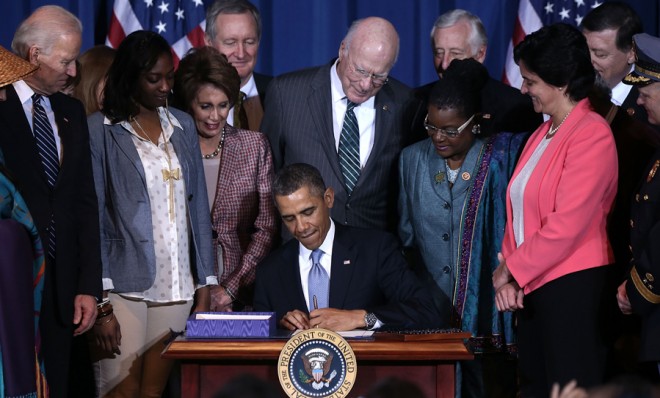Has liberalism run amok under President Obama?
Much attention has been given to growing extremism in the GOP — but critics say progressives are just as bad


Since President Obama's convincing re-election victory, the dominant political story has centered on whether the GOP should counter right-wing elements within its party and undertake moderate reforms that many argue are necessary for Republicans to return to power. But while a proposed Republican makeover has grabbed all the attention — see the much-publicized "autopsy" this week of Mitt Romney's November defeat — developments within the Democratic Party have largely escaped the microscope.
David Brooks, the center-right columnist at The New York Times, argues that liberals have, in fact, lurched leftward under Obama. Brooks focuses on a budget released by the Congressional Progressive Caucus last week, which calls for a massive $2.1 trillion stimulus program composed of new spending and middle-class tax cuts. All of it would be financed by $4.2 trillion in taxes on the wealthy and corporations. Writes Brooks:
Today, House progressives are calling for a huge increase in government taxing and spending when none of those conditions apply. Today, progressives are calling on government to be the growth engine in all circumstances. In this phase of the recovery, just as the economy is finally beginning to take off, these Democrats want to take an astounding $4.2 trillion out of the private sector and put it into government where they believe it can be used more efficiently...
The progressive budget in the House seems to have been written by people hermetically sealed in the house of government. They work in government. They represent public-sector workers. They seem to have had little contact with private-sector job creators and no idea about what factors might play in their thinking. It's a reminder that while Republicans may embarrass on a daily basis, many progressives have lost touch with what actually produces growth and prosperity. [The New York Times]
Jumping on Brooks' bandwagon, Jennifer Rubin at The Washington Post argues that conservatives' problems "are actually mild compared to the really big problem at the core of liberal statism":
The Week
Escape your echo chamber. Get the facts behind the news, plus analysis from multiple perspectives.

Sign up for The Week's Free Newsletters
From our morning news briefing to a weekly Good News Newsletter, get the best of The Week delivered directly to your inbox.
From our morning news briefing to a weekly Good News Newsletter, get the best of The Week delivered directly to your inbox.
Conservatives are honest enough to have conferences and reports trying to address what ails them; liberals simply deny it. No wonder they ran a presidential election almost entirely devoted to destroying the other side. Now the president resorts to campaigning to avoid the dilemma that he insists on growing government without paying for it. [The Washington Post]
It's certainly true that extremism on the right has deflected attention from problematic issues within the Democratic Party. When a majority of House Republicans votes against aid for victims of Hurricane Sandy, against raising taxes on the wealthiest Americans, and against a bill designed to reduce violence against women, it's natural that the spotlight will be on the GOP's divergence from the American mainstream, not the Democrats'.
Furthermore, Rep. Paul Ryan's recently released budget — which would severely cut aid for the poor, to the benefit of the wealthy — is an easy document for Democrats to hold up as an example of radicalism, all while they fail to address their party's own ideologically dangerous tendencies.
However, it's important to note that the Congressional Progressive Caucus does not necessarily represent the majority of the Democratic Party in the way that Ryan's budget is a rough stand-in for the GOP's fiscal and economic policy positions. The CPC does not expect its budget to be passed, and in that respect, it's more useful to see it as a statement of political priorities: Reduce unemployment and expand health care, on the backs of the rich. Ryan's budget is similarly political, but the difference, as Erza Klein at the Post writes, is that "House Progressives don't need to govern. The House Republicans do."
While the House Progressives' fantasyland, no-compromise effort is the illustrative position of a group of minority progressives, Ryan's fantasyland, no-compromise effort is the official position of most every Republican. For there to be a deal, the House Progressives don't need to learn how to compromise, though their voting record over the last couple of years shows they're willing to do it anyway. But the House Republicans do need to learn to compromise, and there's not much evidence they're there yet. [The Washington Post]
Of course, it remains to be seen whether these progressives would ever line up behind a budget deal that would put the sacred cows Medicare and Social Security on the chopping block. The GOP's unwillingness to compromise means Democrats haven't really been put to the test, another advantage of governing alongside an obstreperous opposition.
A free daily email with the biggest news stories of the day – and the best features from TheWeek.com
That said, while our national debt has clearly grown on President Obama's watch, the government has also cut future deficits by $4 trillion over the next 10 years, using a formula in which spending cuts have heavily outweighed tax hikes. Democrats in both chambers of Congress have largely gone along with the spending cuts, even though they target programs that enjoy strong liberal support. And Obama, at least in outline form, has proposed modest reforms to Medicare and Social Security.
The CPC's budget may indeed represent liberalism run wild. But it is hardly a reflection of how liberals have actually governed.
Ryu Spaeth is deputy editor at TheWeek.com. Follow him on Twitter.
-
 Political cartoons for January 3
Political cartoons for January 3Cartoons Saturday's political cartoons include citizen journalists, self-reflective AI, and Donald Trump's transparency
-
 Into the Woods: a ‘hypnotic’ production
Into the Woods: a ‘hypnotic’ productionThe Week Recommends Jordan Fein’s revival of the much-loved Stephen Sondheim musical is ‘sharp, propulsive and often very funny’
-
 ‘Let 2026 be a year of reckoning’
‘Let 2026 be a year of reckoning’Instant Opinion Opinion, comment and editorials of the day
-
 Bari Weiss’ ‘60 Minutes’ scandal is about more than one report
Bari Weiss’ ‘60 Minutes’ scandal is about more than one reportIN THE SPOTLIGHT By blocking an approved segment on a controversial prison holding US deportees in El Salvador, the editor-in-chief of CBS News has become the main story
-
 Has Zohran Mamdani shown the Democrats how to win again?
Has Zohran Mamdani shown the Democrats how to win again?Today’s Big Question New York City mayoral election touted as victory for left-wing populists but moderate centrist wins elsewhere present more complex path for Democratic Party
-
 Millions turn out for anti-Trump ‘No Kings’ rallies
Millions turn out for anti-Trump ‘No Kings’ ralliesSpeed Read An estimated 7 million people participated, 2 million more than at the first ‘No Kings’ protest in June
-
 Ghislaine Maxwell: angling for a Trump pardon
Ghislaine Maxwell: angling for a Trump pardonTalking Point Convicted sex trafficker's testimony could shed new light on president's links to Jeffrey Epstein
-
 The last words and final moments of 40 presidents
The last words and final moments of 40 presidentsThe Explainer Some are eloquent quotes worthy of the holders of the highest office in the nation, and others... aren't
-
 The JFK files: the truth at last?
The JFK files: the truth at last?In The Spotlight More than 64,000 previously classified documents relating the 1963 assassination of John F. Kennedy have been released by the Trump administration
-
 'Seriously, not literally': how should the world take Donald Trump?
'Seriously, not literally': how should the world take Donald Trump?Today's big question White House rhetoric and reality look likely to become increasingly blurred
-
 Will Trump's 'madman' strategy pay off?
Will Trump's 'madman' strategy pay off?Today's Big Question Incoming US president likes to seem unpredictable but, this time round, world leaders could be wise to his playbook